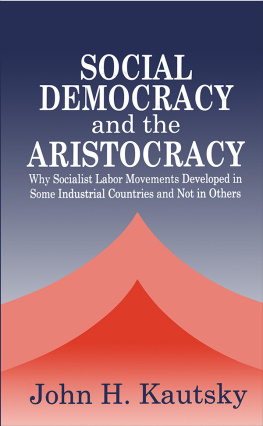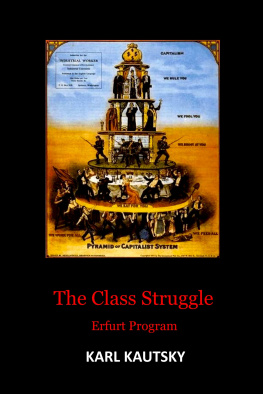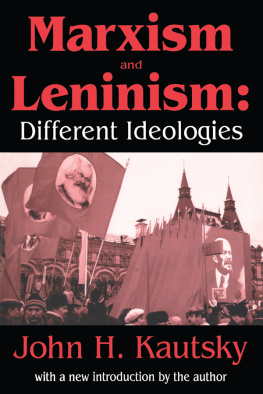SOCIAL
DEMOCRACY
and the
ARISTOCRACY
First published 2002 by Transaction Publishers
Published 2017 by Routledge
2 Park Square, Milton Park, Abingdon, Oxon OX14 4RN
711 Third Avenue, New York, NY 10017, USA
Routledge is an imprint of the Taylor & Francis Group, an informa business
All rights reserved. No part of this book may be reprinted or reproduced or utilised in any form or by any electronic, mechanical, or other means, now known or hereafter invented, including photocopying and recording, or in any information storage or retrieval system, without permission in writing from the publishers.
Notice:
Product or corporate names may be trademarks or registered trademarks, and are used only for identification and explanation without intent to infringe.
Library of Congress Catalog Number: 2001027044
Kautsky, John H., 1922-
Social democracy and the aristocracy : why socialist labor movements developed in some industrial countries and not in others / John H. Kautsky.
p. cm
Includes bibliographical references and index.
ISBN 0-7658-0091-8 (alk. paper)
1. SocialismHistory. 2. Labor movementHistory. 3. Aristocracy (Social class)History. I. Title.
HX36 .K26 2002
324.217dc21 2001054205
ISBN 13: 978-0-7658-0091-6 (hbk)
For Joshua, David and Jeeves
In this book, I am engaged in a project of rethinking and reinterpretation. As such, it is necessarily a mere attempt, and that is why I think of the book and shall refer to it as an essay, even though it is a bit lengthy for one.
While my interpretation of aspects of the history and nature of social democratic labor movements differs quite drastically from traditional and widely accepted ones, I do not wish explicitly to revise anyone elses views, let alone become involved in polemics with anyone. To come to terms at all adequately with the relevant literature would change the character of my essay and at least double or triple its length. I therefore avoid mentioning the name of even a single author with whom I might agree or disagreeexcept a very few times that of Karl Marx who proved too difficult to ignore completely. My object is also not to judge and evaluate socialist labor movements from my own value position. I make no special effort to conceal that position, and it no doubt becomes evident here and there, but it should be of little interest to the reader.
Clearly, I am not engaged in a research project here seeking to discover hitherto unknown facts. The literature on the subjects I touch on is immense, but the historical data I refer to or have in mind as I develop my argument are generally well known. Therefore, to provide anything like complete documentation is both practically impossible, certainly within the compass of a brief book, and also quite unnecessary. When faced only with the undesirable alternatives of offering incomplete and arbitrarily selected documentation or none at all, I chose the latter. Hence I omit all footnotes and, instead, merely list at the end of most chapters a few books that either served as sources of specific data I cited or were particularly useful and stimulating for me when writing these chapters or some of my earlier work.
Written after fifty years of reading, research and teaching, my work here represents an attempt to develop in new directions some thoughts on subjects that have occupied me off and on in the past. A few of these thoughts are elaborated and also documented in different contexts in some of my earlier writings. Being thus, in a sense, sources of the present essay, the most relevant among these writings are also included in the short lists at the end of chapters and hence in the bibliography.
* * *
My essay grew gradually out of lectures I gave at the University of Graz, Austria, in 1997 and at the Dr. Karl Renner Institut in Vienna in 1998. I am grateful to both institutions for inviting me and stimulating me to think.
I am deeply indebted to Gerard Braunthal of the University of Massachusetts, Daniel Hausman of the University of Wisconsin, my son Peter Kautsky; my colleagues at Washington University Robert Salisbury and John Carey, Till Schelz-Brandenburg of the University of Bremen in Germany, and Manfred Steger of Illinois State University. Each of them read a draft manuscript of this essay and offered me his encouragement and advice as well as suggestions for numerous major and minor improvements. These proved invaluable as I revised the manuscript.
As always, I am most grateful to my wife Lilli for putting up with a preoccupied husband for fifty-some years.
The growth of social democratic labor movements in Western Europe in the late nineteenth century was a truly striking phenomenon. Not only did it occur within a short period in a dozen countries and proceed quite uniformly and rapidly, it also involved in each of these countries the formation of a new type of political party, a party with mass membership, whereas hitherto European parties had organized only members of the elite. For the first time in human history, a lower class, indeed the lowest class, was to be organized with the explicit goal of capturing control of local and national governments that had always been and quite naturally seemed to be the possession of the upper classes.
Of course, such a remarkable and novel development called for an explanation, but it was not difficult to find and seemed so obvious and simple that it was hardly questioned. As the socialist labor movements recruited discontented workers, who were organizable and did organize, and as both these workers and their discontent were inevitably produced by industry, the growth of socialist labor movements was generally explained as an inevitable reaction to the growth of industry. And, because, a few decades before Stalin, the growth of industry was still held to be necessarily identical with the growth of capitalism, the socialist movement was also seen as a response toand the enemy ofcapitalism.
There is obviously much truth to this theory. It rests on the sound principle that the appearance of a new element in history, like socialism, must be explained with reference to new factors in history, like industrialism and capitalism. What was more, the theory seemed to provide an adequate explanation for quite some time, for with the growth of capitalist industry, socialist labor movements did grow. To socialists, the theory was attractive for it guaranteed the further development and eventual victory of their movement, assuming that capitalist industrialization would proceed, as they for a long time correctly expected. It thus inspired immense optimism on their part that became a source of their strength and, for better or worse, of their strategies. It may also explain why many socialist thinkers were attracted to social scientific research, as analysis of a problem may be more pleasant when the results conform to ones values.
Already by the end of the nineteenth century, the failure of a significant social democratic labor movement to develop in the United States should have aroused grave doubts as to the simple explanation of socialist labor movements as an inevitable reaction to capitalist industrialism. But that failure was explained as a presumably temporary deviation from a universally valid pattern due to special circumstances. In any case, the United States was, like the rest of the non-European world, widely ignored by European intellectuals theorizing about history.
However, subsequently the United States ceased to be the only exception to the rule. In the twentieth century, several other non-Western European countries became sufficiently industrialized to produce large numbers of workers. Especially by the last decade of that century, capitalism, if it is defined as private ownership of industry, had developed in some of them, and political conditions in a fewI shall specifically refer to Russia, Mexico, and Indiaevolved so as to permit workers to form socialist labor movements. Why have they not done so? That is a question to which I seek an answer in this essay, for the old theory that it is simply capitalism that produces socialist labor movements as a reaction obviously cannot answer this question and requires amendment.












